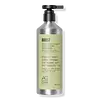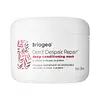What's inside
What's inside
 Key Ingredients
Key Ingredients

No key ingredients
 Benefits
Benefits

 Concerns
Concerns

 Ingredients Side-by-side
Ingredients Side-by-side

Water
Skin ConditioningCaprylic/Capric Triglyceride
MaskingGlycerin
HumectantCetyl Alcohol
EmollientStearyl Alcohol
EmollientHydroxypropyl Starch Phosphate
Arachidyl Alcohol
EmollientStearalkonium Chloride
PreservativeBehentrimonium Chloride
PreservativeParfum
MaskingButyrospermum Parkii Butter
Skin ConditioningSorbitol
HumectantGlyceryl Caprylate
EmollientBehenyl Alcohol
EmollientCrambe Abyssinica Seed Oil
Skin ConditioningDicaprylyl Carbonate
EmollientRosa Canina Fruit Oil
EmollientArachidyl Glucoside
EmulsifyingPisum Sativum Peptide
Skin ConditioningAcetum
Guar Hydroxypropyltrimonium Chloride
Skin ConditioningIsopropyl Alcohol
SolventSodium PCA
HumectantAlcohol
AntimicrobialMangifera Indica Seed Butter
Skin ConditioningCocos Nucifera Oil
MaskingCitral
PerfumingCinnamidopropyltrimonium Chloride
Linalool
PerfumingGlyceryl Undecylenate
EmollientPanthenol
Skin ConditioningBrassica Campestris Seed Oil
Skin ConditioningLinum Usitatissimum Seed Oil
PerfumingEmblica Officinalis Fruit Extract
Skin ConditioningLimonene
PerfumingPolysorbate 80
EmulsifyingGeraniol
PerfumingHydrolyzed Quinoa
Skin ConditioningVanillin
MaskingLeuconostoc/Radish Root Ferment Filtrate
AntimicrobialPrunus Armeniaca Fruit Extract
Skin ConditioningPrunus Persica Fruit Extract
AbrasivePyrus Malus Fruit Extract
Skin ConditioningSodium Benzoate
MaskingMyristyl Alcohol
EmollientPotassium Sorbate
PreservativeBenzyl Alcohol
PerfumingPrunus Amygdalus Dulcis Seed Extract
Skin ConditioningPanicum Miliaceum Seed Extract
Skin ConditioningLinum Usitatissimum Seed Extract
PerfumingOlea Europaea Leaf Extract
PerfumingRosmarinus Officinalis Leaf Extract
AntimicrobialArnica Montana Flower Extract
MaskingLauryl Alcohol
EmollientTocopherol
AntioxidantAcetic Acid
BufferingWater, Caprylic/Capric Triglyceride, Glycerin, Cetyl Alcohol, Stearyl Alcohol, Hydroxypropyl Starch Phosphate, Arachidyl Alcohol, Stearalkonium Chloride, Behentrimonium Chloride, Parfum, Butyrospermum Parkii Butter, Sorbitol, Glyceryl Caprylate, Behenyl Alcohol, Crambe Abyssinica Seed Oil, Dicaprylyl Carbonate, Rosa Canina Fruit Oil, Arachidyl Glucoside, Pisum Sativum Peptide, Acetum, Guar Hydroxypropyltrimonium Chloride, Isopropyl Alcohol, Sodium PCA, Alcohol, Mangifera Indica Seed Butter, Cocos Nucifera Oil, Citral, Cinnamidopropyltrimonium Chloride, Linalool, Glyceryl Undecylenate, Panthenol, Brassica Campestris Seed Oil, Linum Usitatissimum Seed Oil, Emblica Officinalis Fruit Extract, Limonene, Polysorbate 80, Geraniol, Hydrolyzed Quinoa, Vanillin, Leuconostoc/Radish Root Ferment Filtrate, Prunus Armeniaca Fruit Extract, Prunus Persica Fruit Extract, Pyrus Malus Fruit Extract, Sodium Benzoate, Myristyl Alcohol, Potassium Sorbate, Benzyl Alcohol, Prunus Amygdalus Dulcis Seed Extract, Panicum Miliaceum Seed Extract, Linum Usitatissimum Seed Extract, Olea Europaea Leaf Extract, Rosmarinus Officinalis Leaf Extract, Arnica Montana Flower Extract, Lauryl Alcohol, Tocopherol, Acetic Acid
Water
Skin ConditioningCetyl Alcohol
EmollientBrassica Alcohol
EmollientPropanediol
SolventStearyl Alcohol
EmollientCetearyl Alcohol
EmollientPersea Gratissima Oil
Skin ConditioningPrunus Amygdalus Dulcis Oil
Skin ConditioningRosa Canina Fruit Oil
EmollientArgania Spinosa Kernel Oil
EmollientAloe Barbadensis Leaf Juice
Skin ConditioningPanthenol
Skin ConditioningLeuconostoc/Radish Root Ferment Filtrate
AntimicrobialBiotin
AntiseborrhoeicHydrolyzed Corn Protein
Skin ConditioningHydrolyzed Wheat Protein
Skin ConditioningHydrolyzed Soy Protein
HumectantPanax Ginseng Root Extract
EmollientCalendula Officinalis Flower Extract
MaskingLaurus Nobilis Leaf Extract
MaskingPalmaria Palmata Extract
Skin ProtectingSantalum Album Oil
MaskingAmyris Balsamifera Bark Oil
MaskingPogostemon Cablin Leaf Oil
MaskingElettaria Cardamomum Seed Oil
MaskingFerula Galbaniflua Resin Oil
AntimicrobialGuar Hydroxypropyltrimonium Chloride
Skin ConditioningCetyl Esters
EmollientIsododecane
EmollientCetrimonium Chloride
AntimicrobialBehentrimonium Methosulfate
Brassicyl Isoleucinate Esylate
Emulsion StabilisingCitric Acid
BufferingIsopropyl Myristate
EmollientButylene Glycol
HumectantGlycerin
HumectantParfum
MaskingSodium Hydroxide
BufferingDehydroacetic Acid
PreservativeBenzyl Alcohol
PerfumingWater, Cetyl Alcohol, Brassica Alcohol, Propanediol, Stearyl Alcohol, Cetearyl Alcohol, Persea Gratissima Oil, Prunus Amygdalus Dulcis Oil, Rosa Canina Fruit Oil, Argania Spinosa Kernel Oil, Aloe Barbadensis Leaf Juice, Panthenol, Leuconostoc/Radish Root Ferment Filtrate, Biotin, Hydrolyzed Corn Protein, Hydrolyzed Wheat Protein, Hydrolyzed Soy Protein, Panax Ginseng Root Extract, Calendula Officinalis Flower Extract, Laurus Nobilis Leaf Extract, Palmaria Palmata Extract, Santalum Album Oil, Amyris Balsamifera Bark Oil, Pogostemon Cablin Leaf Oil, Elettaria Cardamomum Seed Oil, Ferula Galbaniflua Resin Oil, Guar Hydroxypropyltrimonium Chloride, Cetyl Esters, Isododecane, Cetrimonium Chloride, Behentrimonium Methosulfate, Brassicyl Isoleucinate Esylate, Citric Acid, Isopropyl Myristate, Butylene Glycol, Glycerin, Parfum, Sodium Hydroxide, Dehydroacetic Acid, Benzyl Alcohol
 Reviews
Reviews

Ingredients Explained
These ingredients are found in both products.
Ingredients higher up in an ingredient list are typically present in a larger amount.
Benzyl Alcohol is most commonly used as a preservative. It also has a subtle, sweet smell. Small amounts of Benzyl Alcohol is not irritating and safe to use in skincare products. Most Benzyl Alcohol is derived from fruits such as apricots.
Benzyl Alcohol has both antibacterial and antioxidant properties. These properties help lengthen the shelf life of products. Benzyl Alcohol is a solvent and helps dissolve other ingredients. It can also improve the texture and spreadability.
Alcohol comes in many different forms. Different types of alcohol will have different effects on skin. This ingredient is an astringent alcohol.
Using high concentrations of these alcohols are drying on the skin. They may strip away your skin's natural oils and even damage your skin barrier. Astringent alcohols may also irritate skin.
Other types of astringent alcohols include:
According to the National Rosacea Society based in the US, you should be mindful of products with these alcohols in the top half of ingredients.
Any type of sanitizing product will have high amounts of alcohol to help kill bacteria and viruses.
Learn more about Benzyl AlcoholCetyl Alcohol is a fatty alcohol. Fatty Alcohols are most often used as an emollient or to thicken a product.
Its main roles are:
Though it has "alcohol" in the name, it is not related to denatured alcohol or ethyl alcohol.
The FDA allows products labeled "alcohol-free" to have fatty alcohols.
Learn more about Cetyl AlcoholGlycerin is already naturally found in your skin. It helps moisturize and protect your skin.
A study from 2016 found glycerin to be more effective as a humectant than AHAs and hyaluronic acid.
As a humectant, it helps the skin stay hydrated by pulling moisture to your skin. The low molecular weight of glycerin allows it to pull moisture into the deeper layers of your skin.
Hydrated skin improves your skin barrier; Your skin barrier helps protect against irritants and bacteria.
Glycerin has also been found to have antimicrobial and antiviral properties. Due to these properties, glycerin is often used in wound and burn treatments.
In cosmetics, glycerin is usually derived from plants such as soybean or palm. However, it can also be sourced from animals, such as tallow or animal fat.
This ingredient is organic, colorless, odorless, and non-toxic.
Glycerin is the name for this ingredient in American English. British English uses Glycerol/Glycerine.
Learn more about GlycerinThis ingredient is derived from guar gum.
It is a conditioning ingredient, meaning it helps soften skin and hair.
Leuconostoc/Radish Root Ferment Filtrate is a natural preservative. It comes from fermenting radish roots with a bacteria called leuconostoc.
Leuconostoc comes from lactic acid.
This ingredient has antimicrobial properties and helps prevent the growth of bacteria in a product.
Leuconostoc is used to make the traditional Korean side-dish, kimchi. It is also used to make sourdough bread (both incredibly yummy foods).
Learn more about Leuconostoc/Radish Root Ferment FiltratePanthenol is a common ingredient that helps hydrate and soothe the skin. It is found naturally in our skin and hair.
There are two forms of panthenol: D and L.
D-panthenol is also known as dexpanthenol. Most cosmetics use dexpanthenol or a mixture of D and L-panthenol.
Panthenol is famous due to its ability to go deeper into the skin's layers. Using this ingredient has numerous pros (and no cons):
Like hyaluronic acid, panthenol is a humectant. Humectants are able to bind and hold large amounts of water to keep skin hydrated.
This ingredient works well for wound healing. It works by increasing tissue in the wound and helps close open wounds.
Once oxidized, panthenol converts to pantothenic acid. Panthothenic acid is found in all living cells.
This ingredient is also referred to as pro-vitamin B5.
Learn more about PanthenolParfum is a catch-all term for an ingredient or more that is used to give a scent to products.
Also called "fragrance", this ingredient can be a blend of hundreds of chemicals or plant oils. This means every product with "fragrance" or "parfum" in the ingredients list is a different mixture.
For instance, Habanolide is a proprietary trade name for a specific aroma chemical. When used as a fragrance ingredient in cosmetics, most aroma chemicals fall under the broad labeling category of “FRAGRANCE” or “PARFUM” according to EU and US regulations.
The term 'parfum' or 'fragrance' is not regulated in many countries. In many cases, it is up to the brand to define this term.
For instance, many brands choose to label themselves as "fragrance-free" because they are not using synthetic fragrances. However, their products may still contain ingredients such as essential oils that are considered a fragrance by INCI standards.
One example is Calendula flower extract. Calendula is an essential oil that still imparts a scent or 'fragrance'.
Depending on the blend, the ingredients in the mixture can cause allergies and sensitivities on the skin. Some ingredients that are known EU allergens include linalool and citronellol.
Parfum can also be used to mask or cover an unpleasant scent.
The bottom line is: not all fragrances/parfum/ingredients are created equally. If you are worried about fragrances, we recommend taking a closer look at an ingredient. And of course, we always recommend speaking with a professional.
Learn more about ParfumRosehip Oil is a non-fragrant plant oil. Rosehips are a fruit from a rose bush and are edible. This oil has skin conditioning and hydrating properties.
Rosehip contains Vitamin C, Vitamin E, fatty acids and linolenic acids. These nourish your skin barrier. Having hydrated skin may help reduce the appearance of fine-lines and wrinkles.
Another great component of Rosehip Oil is Vitamin A, or retinol. Vitamin A encourages your skin to create more collagen.
Rosehip oil may help with reducing pigmentation. The lycopene and beta-carotene have skin-lightening properties. However, more studies are needed to confirm this.
Learn more about Rosa Canina Fruit OilStearyl Alcohol is a type of fatty alcohol from stearic acid. It is a white, waxy compound used to emulsify ingredients.
Fatty Alcohols are most often used as an emollient or to thicken a product. Emollients help soothe and hydrate the skin by trapping moisture.
They are usually derived from natural fats and oils and therefore do not have the same drying or irritating effect as solvent alcohols. FDA allows products labeled "alcohol-free" to have fatty alcohols.
Learn more about Stearyl AlcoholWater. It's the most common cosmetic ingredient of all. You'll usually see it at the top of ingredient lists, meaning that it makes up the largest part of the product.
So why is it so popular? Water most often acts as a solvent - this means that it helps dissolve other ingredients into the formulation.
You'll also recognize water as that liquid we all need to stay alive. If you see this, drink a glass of water. Stay hydrated!
Learn more about Water